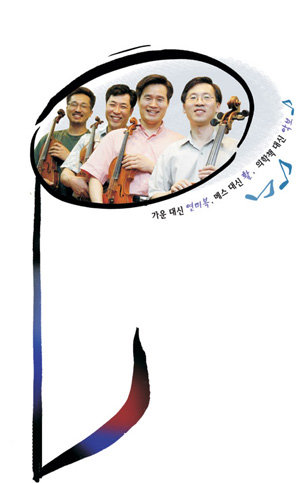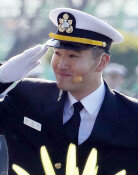Doctors with String Instruments

A dentist, an ophthalmologist, a plastic surgeon, and a professor of parasitology have formed a teambut not for a medical procedure. Instead of white gowns, they wear tuxedoes. In their hands are bows instead of scalpels. Their manual is sheet music. They are the Doctors Quartet, who will perform their first recital, entitled, Compliments, on June 12 at 3:00 p.m. at the Kumho Recital Hall in Sagan-dong, Seoul.
They First Met in the Med School Orchestra in the 1980s-
Until the latter half of the 1980s, medical schools were at the forefront of the amateur orchestra community. Each of us was a core member of his respective part at the time, explained Lee In-sik (40), the second violin and the head of the Bright World Ophthalmic Hospital in Myeong-dong.
He first came to know Jin Hun (40), who plays the viola and is a co-chief at the BK Plastic Surgery Clinic, in the Yonsei University College of Medicine orchestra. Their meeting with Lee Geon-il (41), a former director in the Seoul University College of Dentistry orchestra and the current chief of In Dental Clinic, came through exchanges with an association of dental school orchestras called the Dental Orchestra.
They led hectic lives as interns and residents in the 1990s, but as things settled down, they returned to their beloved instruments. We followed the advice of our friends to gather the best players together, Jin Hun said. So we recruited Yong Tae-sun (47, Professor of Parasitology at Yonsei University), who was above us in years but had been known as the sovereign of the cello among the orchestra members.
Thus began the Doctors Quartet in 2002.
Doctors and Instruments: A Match Made in Heaven?-
We didnt start off by envisioning a public recital. We were tentatively considering it for somewhere down the road when we would have accumulated a repertoire, but after a few sporadic meetings squeezed into busy schedules, we realized that we would only practice in earnest if we had an objective, Lee Geon-il said.
A substantial portion of the audience at domestic concert venues consists of doctors who play instruments themselves. The amateur orchestra movement in Korea was largely led by medical school orchestras until the 1980s. So what makes doctors and instruments such close companions?
The lives of doctors are filled with constant and tremendous stress. Since just sitting there in a daze does nothing to alleviate such stress, we need to concentrate on something in order to resolve it, explained Lee In-sik.
Doctors have a tendency to fix on a goal and obstinately work to achieve it. Playing instruments is ideal for sustaining a constantly renewing technical objective. I suppose we could play golf instead, Jin Hun laughingly added.
Presenting the Music of Complete Absorption-
In their upcoming concert, the four will play Griegs string quartet No. 4 in G minor, Beethovens string quartet No. 2 (Compliments), and Dvoraks string quartet No. 12 (American). Its a traditional repertoire not easily tackled, even by professional performers.
Well incorporate short, easy pieces into our repertoire in the future, but we want to begin in complete seriousness. We titled our concert, Greeting, to signify what it is that we wish to do from now on, Yong Tae-sun said.
Their goal? To immerse themselves in the mysteries of music together until they become old and grey.
You can see it when you go to concerts. Even when youre listening to professionals play, theres a difference between those who do it by force of habit and those who really plunge themselves into it. Although were not perfect virtuosos, well always present music that comes from complete absorption. Were confident of that, the four of them said unanimously.
Open to non-invited guests on a first-come, first-served basis. For more information, call 02-720-5114.
Yoon-JongYoo gustav@donga.com




![반찬통 착색 고민 끝…‘두부용기’ 버리지 말고 이렇게 쓰세요 [알쓸톡]](https://dimg.donga.com/c/138/175/90/1/wps/NEWS/IMAGE/2026/01/09/133126593.3.png)


